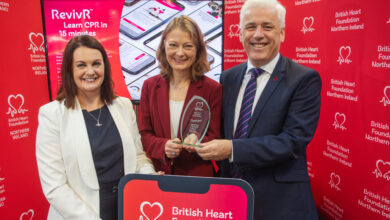Health ICT in practice
 Belfast Health and Social Care Trust CIO Paul Duffy explains how ICT, enabled by Microsoft solutions, makes a difference in delivering healthcare.
Belfast Health and Social Care Trust CIO Paul Duffy explains how ICT, enabled by Microsoft solutions, makes a difference in delivering healthcare.
In Belfast Trust, we have a number of business challenges. We have to ensure that the 700-plus applications that are used daily in the Belfast Trust continue to run effectively. We also have to add more services to that list within our current resources. The lack of the availability of IT systems in healthcare directly impacts the care provided to our patients and clients.
It is most important that we define problems fully before rushing to solutions. It is always tempting to rush to the identification of an app out there that will fix all ills. An evidence-based approach, supported by IT and with full clinical change management is the best way in which the problems can be overcome.
IT-enabled change delivers distinct benefits. IT standardises processes and pathways in a way that the current use of paper cannot. It provides more accurate and timely information on the patient and client that is not locked away in a drawer but shared with all of those involved in that patients care. That can only benefit the patient and their care pathway.
It also can use that information captured in those systems to help us assess if we are delivering it as effectively as possible, alert us to potential problems, and assist in longer term planning to see how changes to our systems will improve the outcome for our patients.
Microsoft is one of our strategic partners in not only providing the basic tools on which our systems, infrastructure and devices depend but also in providing assistance in using that software to produce solutions that improve the outcome for our patients and clients.
We use Microsoft database tools and services (Dynamics, Biztalk, SQL Reporting Services, Excel and Office 365) to assist in the safe delivery and to present a modern clinical interface to users. In addition, Microsoft communication tools enable faster decision-making and analytical tools to help us develop new healthcare processes.
We use Microsoft tools (Forefront Identity Manager, Yammer and Lync) which results in reduced numbers of technical staff involved in supporting our IT infrastructure. Our knowledgeable staff are then directly able to engage with nurses, doctors and other healthcare providers to assist them in providing solutions that address quality, safety and performance improvement.
We are delivering new systems that join up different internal processes adding valued information on the patient. We are using new methods of access, both in and out of the confines of the hospital or treatment centre, to improve the capture of the data and delivering analytics that provide information to clinicians on the performance of their services.
Our focus is on patient/client outcome. Patients are advantaged when information not only about them, but also on the things that happen or need to happen to them, are recorded, accurately, timely and accessed by all those involved in their treatment. This may seem obvious but the healthcare system is extremely complex and generally involves a range of different specialists treating that patient. Knowing where the patient is, their condition and on what they may be waiting in any part of that process is vital to ensure a positive outcome. The scale, complexity and impact of these processes are greater in healthcare than in most other sectors encountered. The safe management of the processes directly improves patient outcome.
As our population grows older with more conditions needing to be managed, this complex mix of services needs IT to assist in its management even more than ever. This is why IT systems that are easy to access, use and integrate are part of the solution in managing that problem.





